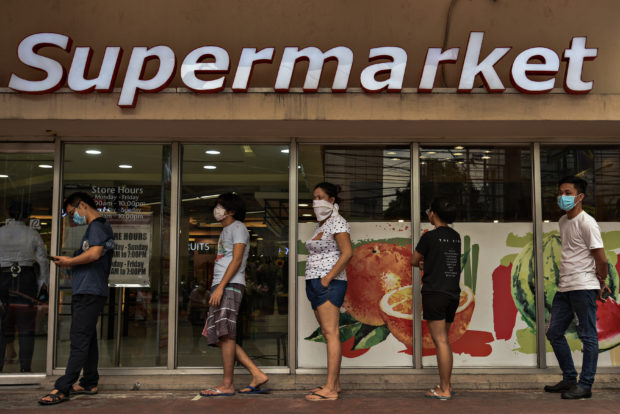
Shoppers stand apart as social distancing measures, amid concerns of the COVID-19 coronavirus, while queueing outside a supermarket in Manila on March 17, 2020. – Philippine President Rodrigo Duterte ordered about half the country’s population to stay home for the next month in a drastic bid on March 16 to curb the rising number of new coronavirus cases. (Photo by Maria TAN / AFP)
Panic-buying in supermarkets before and during the lockdown of Luzon in March boosted the first quarter net profit of Gokongwei-led Retail Holdings Inc. (RRHI) by 45 percent year-on-year to P923 million.
In a disclosure to the Philippine Stock Exchange on Wednesday, RRHI said its earnings were driven by the 40-basis point gain in operating income margin, mainly lifted by the strong performance of newly-acquired grocery chain Rustan.
Core net earnings – which excluded interest from bonds and equitized net earnings from RRHI’s 40 percent stake in Robinsons Bank and unrealized foreign exchange gains or losses- increased by 32.7 percent year-on-year to P784 million.
Consolidated net sales expanded by 7.3 percent to P40.1 billion despite the temporary store closure of the discretionary formats starting March 17 after the implementation of the enhanced community quarantine (ECQ) in Metro Manila and Luzon as a way to curb the COVID-19 pandemic.
Only the essential retail formats, namely, supermarkets, drugstores and convenience stores which are establishments providing basic necessities are allowed to operate by the government during this period. These three segments comprised 77 percent of RRHI’s consolidated sales.
Blended same store sales growth (SSSG) for the first quarter was strong at 6.9 percent, due to “high sales induced by panic buying for essential goods such as food and medicines, most especially in March,” the disclosure said.
Supermarkets generated a record-high SSSG of 18.7 percent and the drugstore segment sustained a double-digit growth of 13.7 percent, coming from an already high base in the comparable period last year. Both segments significantly drove SSSG while the rest of the formats were in the negative territory.